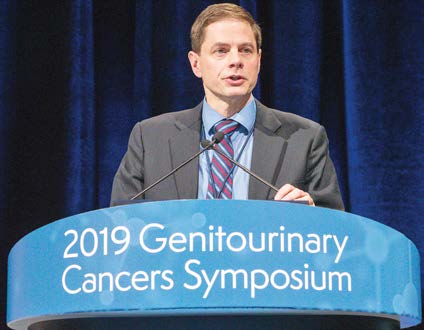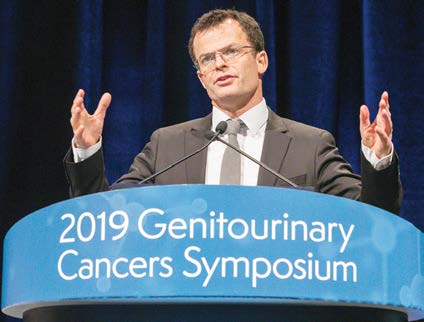
Thomas Powles, MD

Brian Rini, MD
AS REPORTED at the 2019 Genitourinary Cancers Symposium by Thomas Powles, MD, and as published in The New England Journal of Medicine by Brian Rini, MD, and colleagues, significant benefits in overall and progression-free survival were achieved with the combination of pembrolizumab plus axitinib vs sunitinib in the first-line treatment of advanced renal cell carcinoma.1,2 Dr. Powles is Professor of Urology Oncology at the Barts Cancer Institute in London. Dr. Rini is Professor of Medicine at the Cleveland Clinic Lerner College of Medicine at Case Western Reserve University in Cleveland.
The open-label phase III KEYNOTE-426 trial included 861 patients with previously untreated, advanced clear-cell renal cell carcinoma from 124 sites in 16 countries. Patients were randomly assigned between October 2016 and January 2018 to receive the checkpoint inhibitor pembrolizumab at 200 mg once every 3 weeks, plus the vascular endothelial growth factor (VEGF) tyrosine kinase inhibitor (TKI) axitinib at 5 mg twice daily (n = 432), or the multitargeted TKI sunitinib at 50 mg once daily for the first 4 weeks of each 6-week cycle (n = 429). Randomization was stratified according to the International Metastatic Renal Cell Carcinoma Database Consortium (“Consortium”) risk group and geographic region. Patients continued on therapy until disease progression. Patients in whom a complete response was observed could stop treatment.
The co-primary endpoints were overall survival and progression-free survival in the intent-to-treat population.
Survival Outcomes
ON FIRST prespecified interim analysis, after a median follow-up of 12.8 months, the estimated percentage of patients who were alive at 12 months was 89.9% in the pembrolizumab-plus-axitinib group vs 78.3% in the sunitinib group (hazard ratio [HR] = 0.53, P.< .0001). Median progression-free survival was 15.1 months vs 11.1 months (HR = 0.69, P < .001). A benefit of pembrolizumab plus axitinib in both overall survival and progression-free survival rates was observed across all subgroups examined, including all Consortium risk groups and programmed cell death ligand 1 (PD-L1) expression subgroups (combined positive score ≥ 1 or < 1). The objective response rate was 59.3% in the pembrolizumab-plus-axitinib group vs 35.7% in the sunitinib group (P < .001), including complete response in 5.8% vs 1.9%.
Adverse Events
GRADE 3 OR HIGHER adverse events were observed in 75.8% of the pembrolizumab-plusaxitinib group vs 70.6% of the sunitinib group. Grade 3 or higher adverse events that occurred in 10% or greater number of patients were hypertension and increased alanine aminotransferase in the pembrolizumab-plus-axitinib group and hypertension in the sunitinib group. Adverse events of special interest occurred in 51.3% vs 36.2%, including grade 3 or higher events in 11% vs 2%.

© ASCO/Todd Buchanan 2019.

© ASCO/Todd Buchanan 2019.
Adverse events led to discontinuation of either drug in 30.5%, and both drugs in 10.7%, of patients in the combination group and to 13.9% of patients in the sunitinib group. Death due to treatment-related adverse events occurred in four patients in the combination group (0.9%; due to myasthenia gravis, myocarditis, necrotizing fasciitis, and pneumonitis) and in seven patients in the sunitinib group (1.6%; due to acute myocardial infarction, cardiac arrest, fulminant hepatitis, gastrointestinal hemorrhage, intracranial hemorrhage, malignant neoplasm progression, and pneumonia).
The investigators concluded that treatment with pembrolizumab plus axitinib vs sunitinib resulted in significantly longer overall survival and progression-free survival rates. Objective response rates were also higher in the group receiving pembrolizumab plus axitinib vs the group receiving sunitinib. ■
DISCLOSURE: Dr. Powles has received honoraria from Bristol-Myers Squibb, Merck, and Roche/Genentech; is a consultant/advisor for AstraZeneca, Bristol-Myers Squibb, Genentech/Roche, Merck, and Novartis; has received research funding from AstraZeneca/MedImmune and Roche/Genentech; and has other relationships with Bristol-Myers Squibb and Ipsen. Dr. Rini has received honoraria for research funding, consulting, and speakers bureau participation from Astellas, AstraZeneca, Bayer, Bristol-Myers Squibb, Janssen, Roche, and Sanofi. The study was funded by Merck Sharp & Dohme. The study authors’ full disclosures can be found at coi.asco.org and nejm.org.
REFERENCES
1. Powles T, Plimack ER, Stus V, et al: Pembroliumab plus axitinib vs sunitinib as first-line therapy for advanced renal cell carcinoma: Phase III KEYNOTE-426 study. 2019 Genitourinary Cancers Symposium. Abstract 543. Presented February 16, 2019.
2. Rini B, Plimack E, Stus V, et al: Pembrolizumab plus axitinib vs sunitinib for advanced renal cell carcinoma. N Engl J Med 380:1116-1127, 2019.


